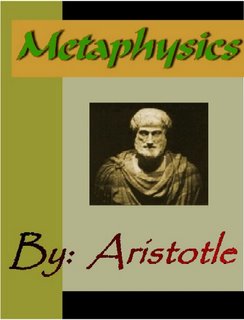 Being and substance are identical with each other insofar as all the properties of one are present to the other. Furthermore, the statement “Being is[1] substance” is always dependent on how the terms “being” and “substance” are defined; and thus, one could defend the truthfulness of this statement based on the definitions he made. In this course of work, we have to stick to Aristotle’s definition so as to examine his view.
Being and substance are identical with each other insofar as all the properties of one are present to the other. Furthermore, the statement “Being is[1] substance” is always dependent on how the terms “being” and “substance” are defined; and thus, one could defend the truthfulness of this statement based on the definitions he made. In this course of work, we have to stick to Aristotle’s definition so as to examine his view.Concerning the term “being”, two senses could be observed based on how it is used in language. On one hand, “being” is used to explicate a property of a thing, e.g. “Diory, as being tall[2]”, wherein tall is just a part of Diory. If we were to translate this to a categorical statement, it would be “Diory is tall”, where the term “is” is used in terms of predication. On the other hand, “being” is also used to explicate an identity; that to say “X is Diory’s being” is to say X is Diory’s is-ness or in Aristotle’s terms, what-it-is. Thus, in the statement “Diory is X”, “is” is used to explicate that X and Diory are identical – that to speak of Diory is to speak of X, or of Diory’s is-ness. This second sense of being is the concern of Aristotle and that which he said as identical with “substance”. As already stated that the substance is the being in this second sense, the definition of the substance itself must not be that which is predicated (like the being in the first sense), but that which is the is-ness.
Though not explicitly stated, it is implied in Metaphysics that Aristotle equates “substance” with “essence” (what a thing is in its own right)[3]. However, this explication on substance as essence is not yet clear, so we have to consider his definition that substance is the “primary cause” of the thing’s being (1041b). This cause, which he also calls the essence, is not the cause as we use it in terms of “cause-and-effect”. His idea of cause will be better understood in terms of his idea on “potentiality” and “actuality”. By potentiality, he is referring to the “matter” by which a thing potentially is (e.g. stones, bricks and timber by which a house potentially is). By actuality, he is referring to the “form” (e.g. that a house is a container sheltering possessions and living bodies, 1043). By essence, cause and/or substance, he is referring to the structure of the compound of the matter (potentiality) and form (actuality).
It is good that Aristotle defined substance as “the is”, but there is a danger in equating “the is” with the compound of the “matter” and “form”. To do such is to reduce the substance (or being, as he said that they are identical) into a thing’s facticity. Aristotle is saying that the being/essence/substance of a man is that he has a flesh, organs, tissues, etc. (as the matter) and is a rational animal (as the form). It is as if all men have the same being[4]. I will point out that this is not the case. My being is different from Aristotle’s being or to Rico Yan’s being, though we are all human beings. I am not only a human being for I also am my possibilities. Thus, I, my is-ness and/or my being, am/is different from others as we have different possibilities. Furthermore, no one can ever tell me the is-ness of my being, not even Aristotle. It is even difficult for me to uncover my very being, as I do not know yet my possibilities.
Aristotle’s concept of potentiality is not the same with the possibilities I am talking about. Potentiality refers to how the thing will be or came to be and is (together with actuality) in the material world. Possibilities, on the other hand, are not in the material world because they are the future, and they do not yet exist.
Potentiality and actuality (as existing only in the material world) deal only with facticity; but then again, the is-ness is also about possibilities. Defining “being” in terms of Aristotle’s “substance” is to consider a being as having a defined end. To consider such, is to take away the possibilities the being has. If substance is the structure of the compound of matter and form, it s not right to say that it is “the is”. It is (and must) not be identical to the “being”, if being is the is-ness of a thing.
[1] “is” here, is used to explicate an identity
[2] this is just an example; I admit that I really am not tall
[3] where Aristotle states that the substance is “the is”
[4] This is not explicitly stated in the Metaphysics, but his arguments imply this.
No comments:
Post a Comment